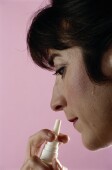Nasal Irrigation Can Help Fight Spring Allergies
Ingredients can be bought over the counter and safely used at home.
|
E-mail this article
Subscribe to news
Printer friendly version
|

(SOURCE: University of Michigan Health System, news release, April 2008)
SUNDAY, May 11 (HealthDay News) -- When you're doing your spring cleaning, don't forget your nose.
Nasal irrigation is a cheap and easy way for people with spring allergies, nasal congestion, stuffy noses and post-nasal drip to get relief, says Dr. Melissa Pynnonen, co-director of the Michigan Sinus Center and an assistant professor in the University of Michigan's department of otolaryngology.
Nasal irrigation involves rinsing the nose and nasal passages with a solution made with a quarter-teaspoon of kosher salt, eight ounces of warm tap water and a quarter-teaspoon of baking soda.
There are a number of ways to administer the solution. For people who've never done nasal irrigation, Pynnonen recommended using an eight-ounce squeeze bottle and squirting four ounces of the solution into each nostril. The solutions exits through the opposite nostril. Opening your mouth and making a "K" sound will prevent the solution from coming out of your mouth.
Some people use a neti-pot, which looks like a miniature teapot. When using a neti-pot, the solution is poured, rather than squeezed, into the nose. Turkey basters or syringes like those used to suction a baby's nose also work.
"For most patients, the benefit of nasal irrigation is that it does a great job of treating symptoms that otherwise aren't well treated with medicine," Pynnonen said in a prepared statement. "Nasal irrigation can be considered a first-line treatment for common nasal and sinus symptoms. It's often more effective than medications," she concluded.
Nasal irrigation alone may be sufficient to control mild allergy symptoms in some people, but others may need to used medications in addition to nasal irrigation.
So long as children are old enough to cooperate, it's safe to give them nasal irrigation, using a smaller amount of solution, Pynnonen said.
More information
Queen's University in Kingston, Ontario, Canada, has more about nasal irrigation. 
Copyright © 2008 ScoutNews, LLC. All rights reserved. 
HealthDayNews articles are derived from various sources and do not reflect federal policy. healthfinder.gov does not endorse opinions, products, or services that may appear in news stories. For more information on health topics in the news, visit the healthfinder.gov health library.